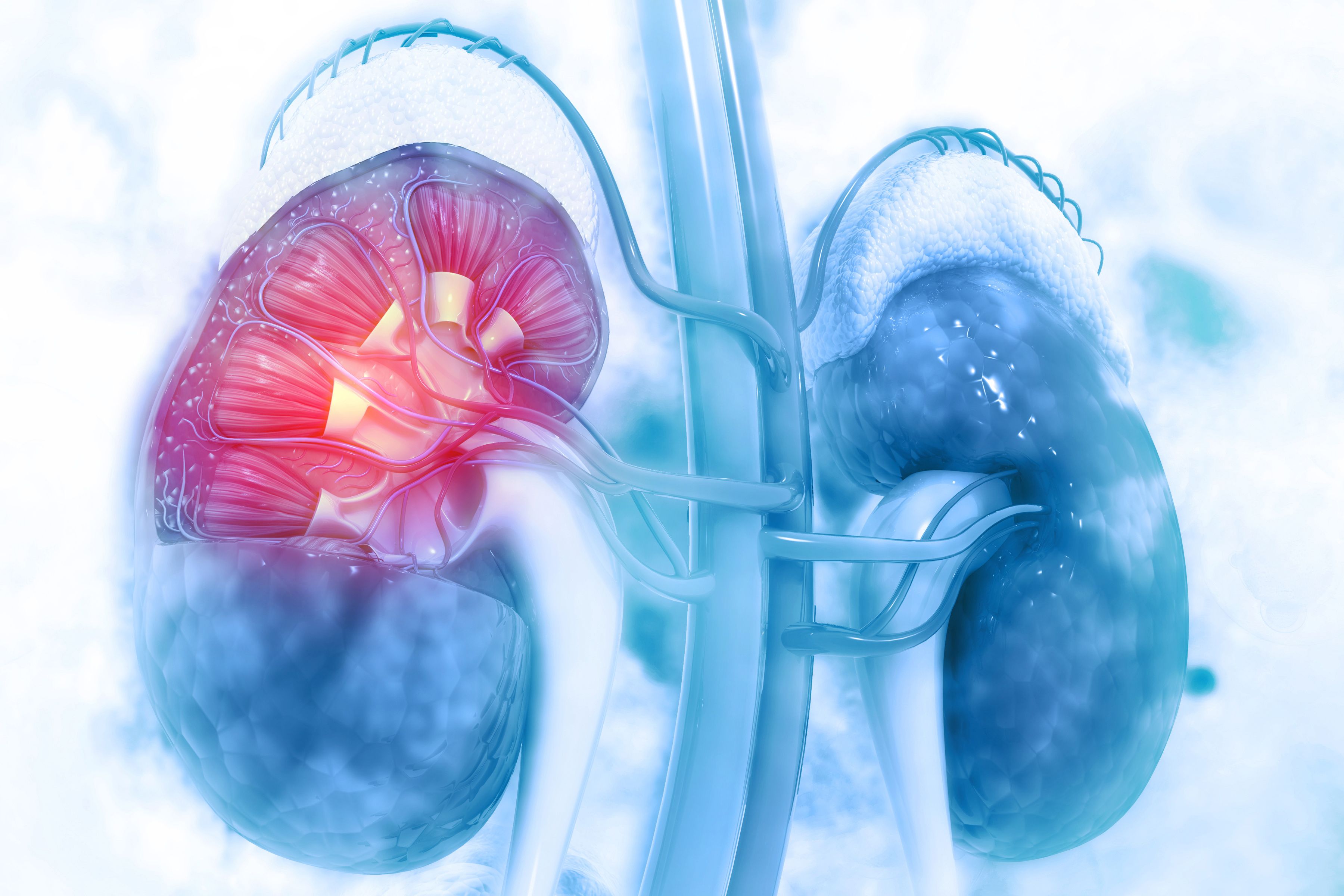New Targets Needed for Immunotherapy in Metastatic RCC
While immunotherapy has high and durable response rates, most patients die of the disease.

Great progress has been made using immunotherapy for the treatment of metastatic renal cell carcinoma (RCC), however, most patients still die of the disease and more options and new targets are needed, according to a presentation given by Moshe C. Ornstein, MD, MA, at the International Kidney Cancer Symposium North American 2021 Annual Congress.1
In 1998 the median overall survival (OS) with interferon alfa-2a was 13 months, 12 months with interleukin-2, and 17 months with a combination of the agents. In 2021, median OS using nivolumab (Opdivo) and ipilimumab (Yervoy) is 55.7 months and 38.4 months with sunitinib (Sutent) (95% CI, 0.62-0.85; P < .0001).2-3
Additionally, numerous combination trials have also yielded promising results. CheckMate 214 (NCT02231749), which evaluated nivolumab and ipilimumab versus sunitinib found the combination had a median progression-free survival (PFS) of 12.3 months (95% CI, 0.73-1.01). The landmark 12-month OS was 83% with the combination versus 78% with the monotherapy. At 24 months, the landmark OS was 71% and 61%, respectively. The overall response rate (ORR) was 39% in the combination arm versus 32% in the monotherapy arm, with a complete response rate of 12% and 3% respectively.4
The KEYNOTE426 trial (NCT02853331) found that the combination of pembrolizumab (Keytruda) and axitinib (Inlyta) had an OS of 45.7 months compared with 40.1 months with sunitinib monotherapy. The landmark OS at 12 months was 90% with the combination and 79% with the monotherapy. At 24 months, the landmark OS was 74% and 66% respectively. With the combination, the median PFS was 15.7 months compared with 11.1 months with the monotherapy, and the complete response rate was 10% and 4%, respecivily.5
The CheckMate 9ER study (NCT03141177) looked at nivolumab plus cabozantinib (Cabometyx) versus sunitinib. The median OS was not reached with the combination versus 29.5 months with the monotherapy. The 12-month OS was 86% for the combination and 76% for the monotherapy with the 24-month OS being 72% and 60%, respectively. The median PFS was 17 months with the combination. The ORR was 55% with the combination and 27% with the monotherapy, with a complete response rate of 9% and 4%, respecivtly.6
The CLEAR trial (NCT02811861) evaluated the efficacy of pembrolizumab and lenvatinib (Lenvima) versus everolimus. While the OS was not reached in either arm, the 12-month OS for the combination was 90% and the 24-month OS was 79% and 70%, respectively, for the monotherapy. The median PFS was 23.9 months with the combination and 9.2 months with the monotherapy. The ORR was 71% in the combination arm and 36% with the monotherapy, with a complete response rate of 16% and 4%, respectively.7
“I think more important than highlighting these specific drugs and specific targets is highlighting the idea that, although immunotherapy is great now, there is still a way to go,” said Ornstein, who is a genitourinary medical oncologist at the Cleveland Clinic Taussig Cancer Institute.
However, according to Ornstein, even with the higher response and durable response rate, most patients still die of metastatic RCC. Additionally, many patients still develop progressive disease and not all patients “need” immunotherapy.
Further, there are options that have yet to be explored, according to Ornstein. These include using the metabolic pathway to improve immunotherapy response rates and cellular therapy. Additionally, the inhibition of anti-inflammatory cytokines is also an option to help improve outcomes in the metastatic RCC population.
“What are the possibilities? How do we go from what is ultimately a lethal disease, metastatic RCC, and leverage what we know about immunotherapy to develop the next wave,” said Ornstein. “Understanding the local environment, the peripheral environment, in a static environment is how we develop the next wave of immunotherapy agents.”
REFERENCES:
1.Ornstein M. Novel Immunotherapy Targets. Presented at IKCS 2021. Austin Tx, November 4-5; 2021.
2.Negrier S, Escudier B, Lasset C, et al. Recombinant human interleukin-2, recombinant human interferon Alfa-2a, or both in metastatic renal-cell carcinoma. N Engl J Med 1998; 338:1272-1278 doi: 10.1056/NEJM199804303381805.
3.Powles T, Albiges L, Bex A, et al. Renal cell carcinoma treatment recommendations. ESMO. September 28, 2021. Accessed November 5, 2021. https://bit.ly/3woKId8
4.Motzer R, Tannir N, McDermott D, et al. Nivolumab plus ipilimumab versus sunitinib in advanced renal-cell carcinoma. N Engl J Med 2018; 378:1277-1290 doi: 10.1056/NEJMoa1712126
5.Rini B, Plimack E, Stus V, et al. Pembrolizumab plus axitinib versus sunitinib for advanced renal-cell carcinoma. N Engl J Med 2019; 380:1116-1127 doi: 10.1056/NEJMoa1816714
6.Choueiri T, Powles T, Burotto M, et al. Nivolumab plus cabozantinib versus sunitinib for advanced renal-cell carcinoma. N Engl J Med 2021; 384:829-841 doi: 10.1056/NEJMoa2026982
7.Motzer R, Alekseev B, Rha S, et al. Lenvatinib plus pembrolizumab or everolimus for advanced renal cell carcinoma N Engl J Med 2021; 384:1289-1300 doi: 10.1056/NEJMoa2035716
Enhancing Precision in Immunotherapy: CD8 PET-Avidity in RCC
March 1st 2024In this episode of Emerging Experts, Peter Zang, MD, highlights research on baseline CD8 lymph node avidity with 89-Zr-crefmirlimab for the treatment of patients with metastatic renal cell carcinoma and response to immunotherapy.
Listen
Beyond the First-Line: Economides on Advancing Therapies in RCC
February 1st 2024In our 4th episode of Emerging Experts, Minas P. Economides, MD, unveils the challenges and opportunities for renal cell carcinoma treatment, focusing on the lack of therapies available in the second-line setting.
Listen
Peers Discuss Management of IO/TKI Toxicities and Dosing Strategies in Frontline RCC
March 11th 2025During a Case-Based Roundtable® event, Elizabeth M. Wulff-Burchfield, MD, and other participants discussed their experiences with the frontline combination regimens for advanced renal cell carcinoma.
Read More